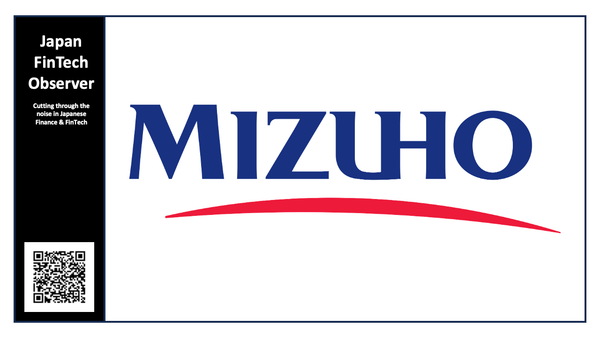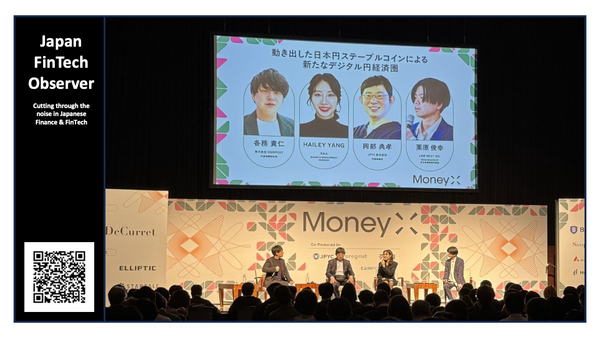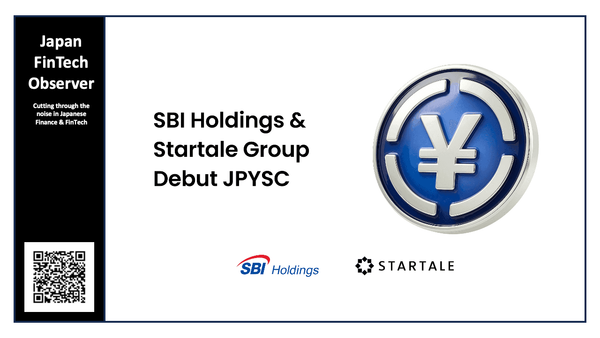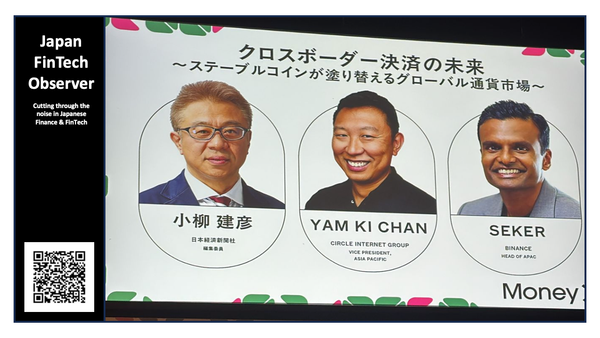Sushi Tech #1 - Leading VCs and CVCs from Five Southeast Asian Countries
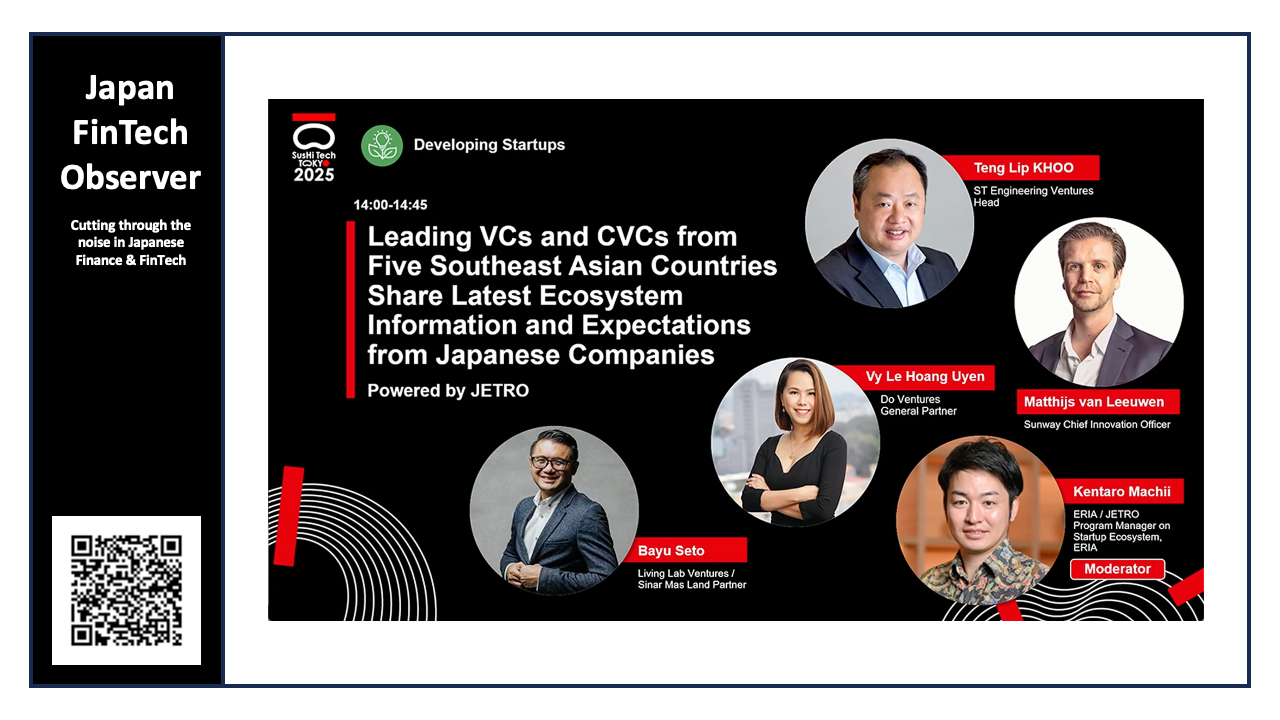
The panel discussion emphasized the opportunities and challenges for startups in the Southeast Asian region. It highlighted the need for realistic valuations, strategic collaborations, a deep understanding of local markets, and a focus on long-term commitment in order to succeed in the region. In short, relationships are key in Southeast Asia. It also reinforced the idea that the potential of the Southeast Asian market, especially with the current global circumstances in mind, will be a future key driving force.
Key Takeaways
- Tech Winter in Southeast Asia: Acknowledgment of the ongoing "tech winter" impacting startup funding and valuations across Southeast Asia.
- Indonesia's Strategic Approach: Bayu Seto highlighted Living Lab Ventures' strategy of leveraging the tech winter to acquire startups at realistic valuations and fostering strategic collaborations with those startups to drive innovation within Sinar Mas Land's city-building projects.
- Malaysia's Data Center Push: Matt van Leeuwen highlighted the growing data center sector in Malaysia and opportunities for deep tech startups offering solutions to improve data center efficiency.
- Vietnam's Focus on Specific Sectors: Vy Le emphasized the resilience of sectors like healthcare, education, and business automation (AI) in Vietnam. She also pointed to the increasing collaboration between Vietnamese startups and Japanese companies.
- Singapore's Deep Tech Focus: Teng Lip Khoo emphasized the Singaporean government's support for deep tech startups and the opportunities for collaboration with ST Engineering across various domains.
- Importance of Localization: Several panelists highlighted the need for Japanese companies to adapt their technology and products to local conditions in Southeast Asia.
- Long-Term Commitment: The importance of long-term commitment and building meaningful relationships was emphasized, particularly in the context of working with Japanese companies.
- Leveraging Local Talent: The accessibility of talent pools in Southeast Asia, particularly in the field of AI engineering, was mentioned as an advantage for companies looking to expand into the region.
Introductions
Vy Le, Do Ventures (Vietnam)
Vy Le shares her entrepreneurial journey, emphasizing early experience with a web design company at age 13 and launching a fashion e-commerce platform at 22. She started investing as a professional venture capitalist in Vietnam at 31, then five years ago, founded Do Ventures, her first VC fund.
Do Ventures raised $50 million USD in 2020, collaborating with reputable LPs, including JAFCO in Japan, entities from the Korean government, and Vertex Holdings from Singapore.
Do Ventures invests in technological companies that enable the lives of young customers while also supporting SMEs with digitalization and access to financing solutions. They have invested in many rising startups in Vietnam, such as Manabie, founded by a Japanese entrepreneur who expanded to Japan, and Vietnamese-based companies such as Palexy (partnering with Hakuhodo in Japan) and Finhay (partnering with Japanese companies to develop products for the Vietnam market). Finally, Do Ventures often co-invests with Japanese funds.
Beyond its current ecosystem, Do Ventures supports Japanese companies and startups entering the Vietnamese market. They leverage their portfolio companies' customer and merchant bases for cross-sales and channel partnership opportunities. They organize tech events in Vietnam for access to a broader community, foster collaboration with conglomerates and corporates, and work with the Ministry of Finance and Ministry of Science and Technology to help Japanese companies navigate the regulatory landscape in Vietnam.
Teng Lip Khoo, ST Engineering Ventures (Singapore)
Teng Lip Khoo is responsible for the corporate venture capital unit of ST Engineering (STE). STE is a global technology, defense, and engineering group operating across aerospace, smart cities, and defense/public security. STE is the largest engineering company in Singapore, listed on the Singapore stock exchange, and 51% owned by Temasek. ST Engineering Ventures invests in startups globally to keep track of market trends, to engage startups to collaborate, and to invest in startups especially when STE wants to build new business and products.
ST Engineering Ventures is a $150 million fund, and can lead and syndicate deals, but typically leads about 70% of the time when investing. Check size is approximately 10-15 million USD per startup but first check is in the 4-8 million range, and can invest up to series B. Investments are strategic, requiring some rationale or collaboration with STE's business units, but a pot also exists for startups important to the group, even if there's no immediate unit to work with. Collaboration is key, with the goal being either integrating or co-developing solutions, with startups leveraging STE's global network and GTM together.
Focus areas include deep tech, B2B, B2G, and enterprise, encompassing autonomous technologies, IoT, communications, robotics, DAAI, cybersecurity, cloud, sustainability, new materials, and advanced manufacturing. ST Engineering Ventures also engages in venture building, with half the team building new businesses for the group from zero to one. One-third of their portfolio is from the US, one-third from Israel, and one-third from Europe and Asia. There has yet to be any activity in Japan, but they hope to change that very soon. Startups build new businesses or co-create new products with STE, digital space, cybersecurity space, communications, connected vehicles, and certain emerging technologies.
Bayu Seto, Living Lab Ventures (Indonesia)
Bayu Seto presents Living Lab Ventures, a part of Sinar Mas Group, one of Indonesia's largest conglomerates. Sinar Mas provides 380,000 jobs a year and is 100% owned by Sinar Mas Land, a property sector leader with a presence in seven countries and a full stack of property products including office buildings, malls, residential estates, golf courses, and trade centers. Sinar Mas Land's main position is not as property developers, but as city builders.
Their flagship city, BSD City, a 6000-hectare area (similar to the Yamanote Line in Tokyo, 10% of Singapore) with more than 500,000 people in the cities. BSD City is very young with a generation 30 to 40% younger population, BSD City is where Apple put their second Apple Academy in APAC. The city is also home to Microsoft Experience Centers and NTT experience centers.
Sinar Mas Land wants to create economic opportunities for the cities they build. It has created Living Lab Ventures to create innovation and new economic systems in its cities. It has $160 million deployed into 40 to 50 companies and is looking to deploy more.
Living Lab Ventures does a global partnership, engaging with agencies like JETRO to attract companies and joint ventures, to create economic growth in its cities. They are creating a Japan thematic fund to attract Japanese cooperation to increase product adoption in Southeast Asia, as well as invest in Japanese startups that want to expand into Southeast Asia.
Matt van Leeuwen, Sunway iLabs (Malaysia)
Matt van Leeuwen is the Chief Innovation Officer in the Sunway Group and runs Sunway iLabs, the innovation and corporate venture capital arm. Sunway iLabs is eager to meet with startups and other venture capitalists to form new partnerships.
Matt shares the history of Sunway City, which was originally mining land. The founder had a vision to turn that wasteland into a sustainable integrated city. In order to do this, he received a $30,000 USD check. Sunway has a number of different business units spanning from construction development, team parks, hotels, as well as education, a playground for entrepreneurs.
Sunway iLabs was born 8 years ago as a platform to work with student entrepreneurs, startups, and other industry players to grow innovation.
Sunway iLabs invests in areas like healthcare and property technology, as well as into the future - energy transition, data centers (looking into quantum), deep tech, and AI.
The three verticals that iLabs have is on education (25000 students), cross-border programs (where they've incubated more than 30 Japanese startups). Sunway has raised a $20 million fund and has helped in a few CVCs for hundreds of thousands of dollars.
Discussion of Startup Investment Trends
Kentaro Machii steers the discussion to the current trend of startup investment. He refers to the downward trend, noting that it is called the "Tech Winter," and asks the panelists about their view of the trends in their respective countries, and if there is any good news.
Bayu mentions he sees an opportunity in the tech winter, a reevaluation on startups. Bayu can now buy startup companies at real evaluations (not inflated) with the same level of performance. Also, he looks for strategic collaboration into the startup, knowing the process for Indonesia will be taking 10 to 15 years. That value from startups provides value into our corporation, creating a captive market for them.
Matt thinks for the last 10 years, the world has seen digitalization happen across different industries like healthcare, education, and property. The industry has been growing quite a bit. Before it was ground zero, he sees the industry now as becoming vibrant. The data center space is a huge trend.
Where energy is still relatively cheap, deep tech and cooling technologies really can help to run center better.
Vy thinks the market in Vietnam is still young, but is growing. She has noticed in Vietnam, the Super Start industry was Healthcare and Education, and the investment was in business automation like AI. Last year the number of investments increased 8x as compared to the year before. She noted Qualcomm's acquisitions of Vine AI. The segment to look at is climate tech.
Teng mentions how Singapore is not immune to the trend. The global Southeast Asia just startup lack exits, then VCs can't raise new money, and recycle and invest in new startups. However, he mentioned for VC, he looks at Asia, Middle East, and US.
With a very strong government that is supportive of startups, he encourages those in biotech, healthcare, semi-semicon, quantum, and robotics, for example. The government has a lot of schemes and non-directed funding. There are also VC in deTech that are global - as well this week there's Equal Prosperity Week in Singapore.
Smart City Initiatives & Japanese Collaboration
Kentaro Machii continues the discussion, focusing on smart city initiatives and collaboration with Japanese startups. He asks panelists to share remarkable cases of collaboration in their countries.
Matt shares that the first program was with JETRO, first part offline, a lot of companies coming to Malaysia, and then online mode. The Japanese company was Toy 8, which is education, Technology company, had AI for test. So then, the Sunway Company has a lot of people (education group) for example. To solve this, he has said it's not just about the technology, but the localizing in the market.
He offered the tool in his preschool. He then expanded to Indonesia and the Philippines. They love him (Matt) because he has a good impact.
Working with Japanese cooperations, Bayu is looking on two things. First, the fusion of the company but long-term commitment of the company for 25 to 30 years. The Japanese believe in his company.
A company he worked with Nito Denko, a Japanese company. There's a gap in innovation in Indonesia, so they are working with the R&D centers. They come to Bayu and then he will partner and the local partnership.
For this startup, Teng looks at working at the process or look at the customer to solve the issue. It is a system integrator. Look in 5 areas: operations, platforms, autonomous systems, product, services, and productivity.
He notes Singapore is a large developer in building hospitals and operation and AI. He mentions the land, sea, and air sectors.

